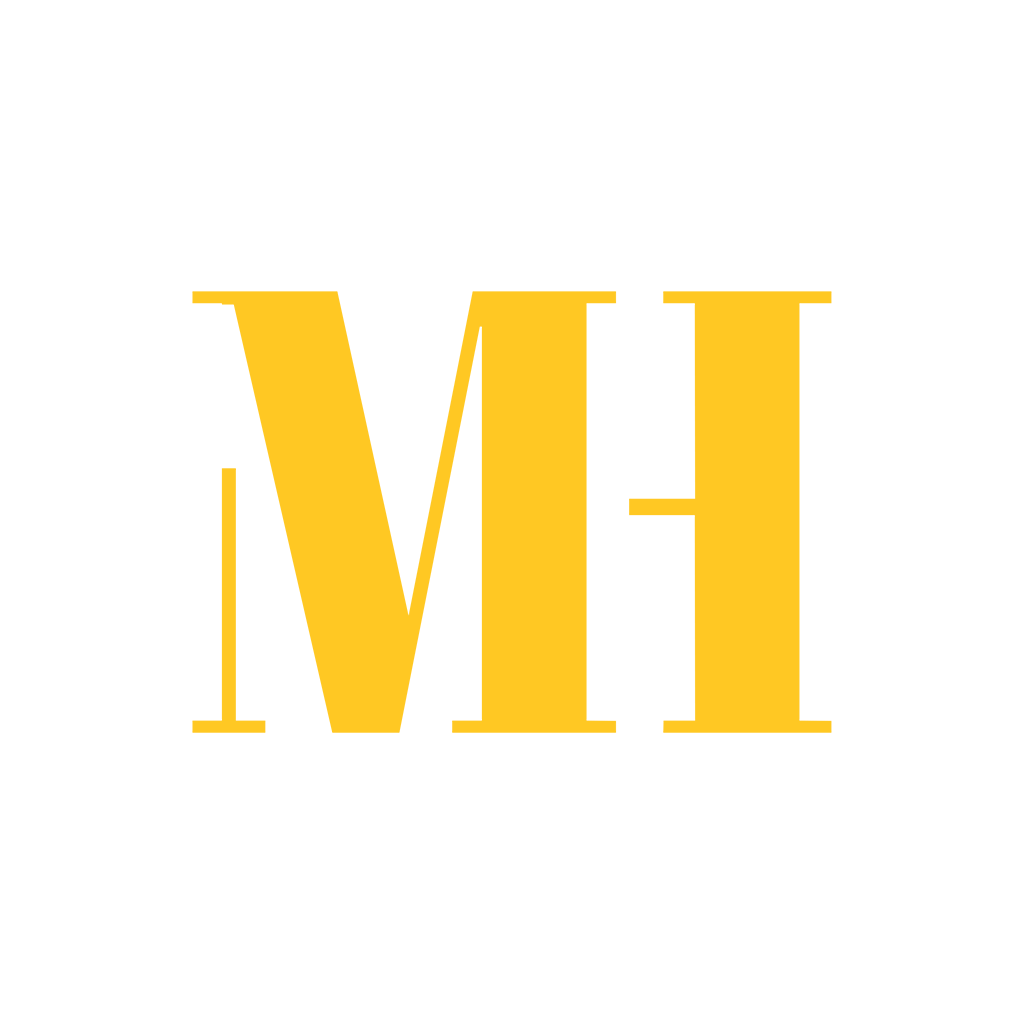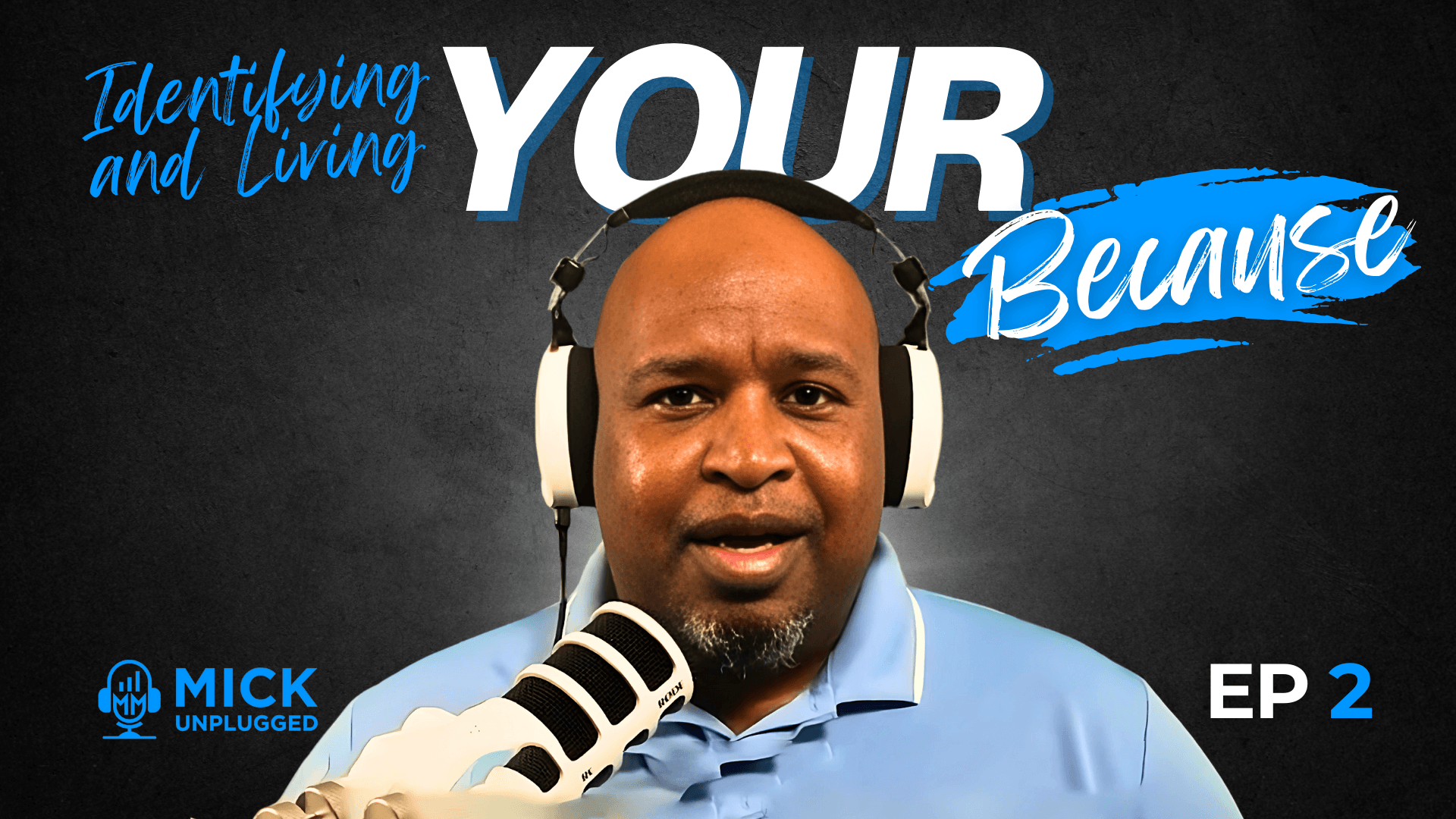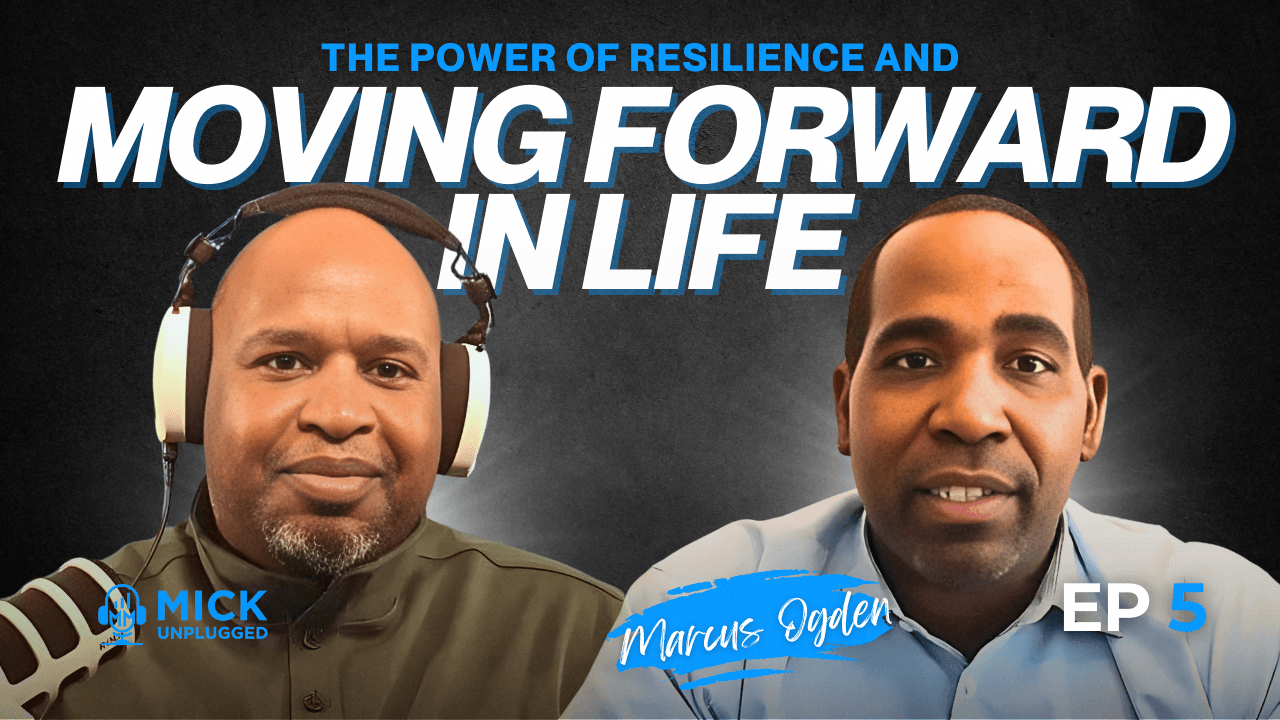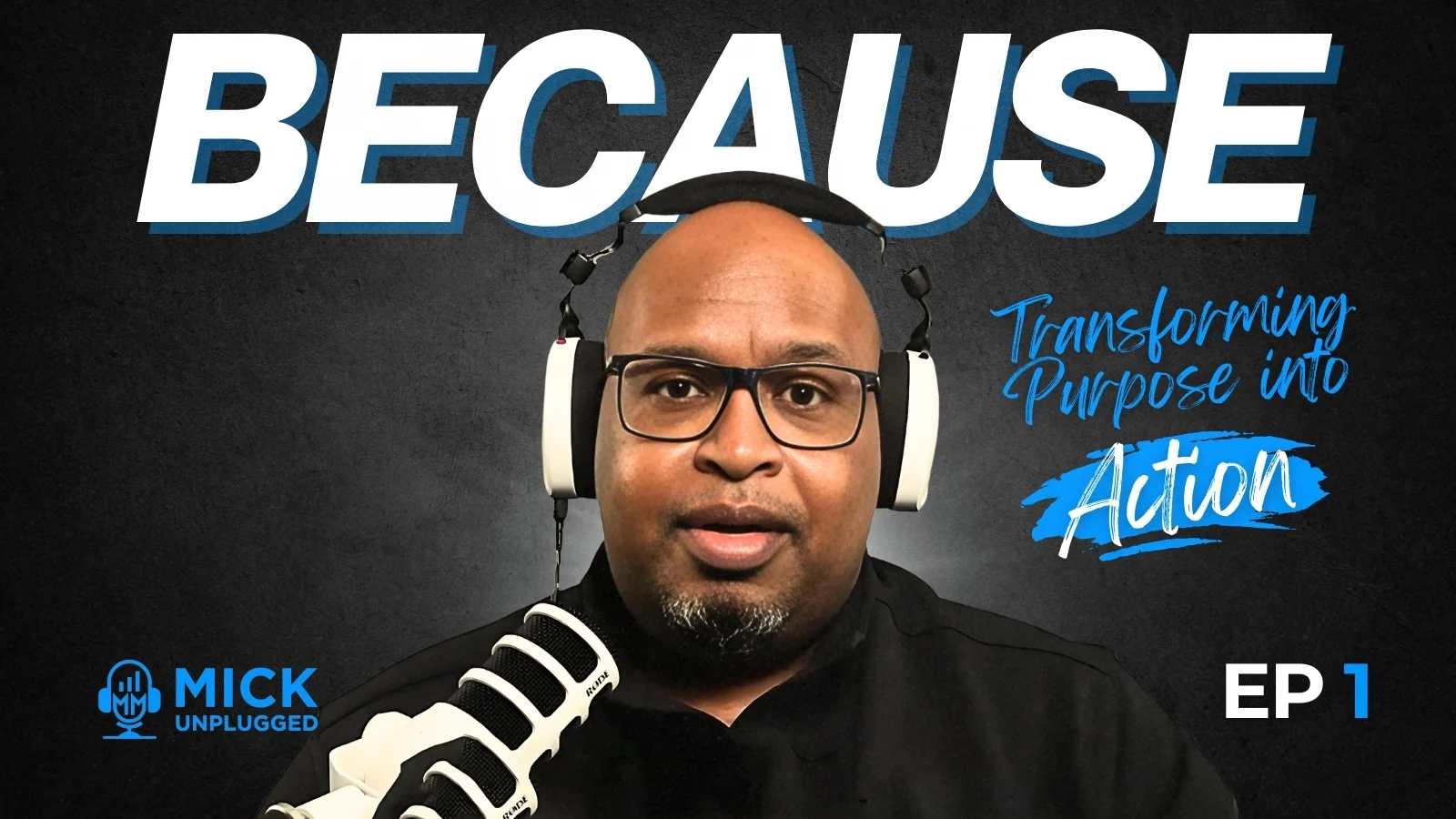[00:00:00] Podcast Intro: Are you ready to change your habits, sculpt your destiny, and light up your path to greatness? Welcome to the epicenter of transformation. This is Mic Unplugged. We’ll help you identify your because, so you can create a routine that’s not just productive, but powerful. You’ll embrace the art of evolution, adapt strategies to stay ahead of the game, and take a step toward the extraordinary.
[00:00:29] So let’s unleash your potential. Now, here’s
[00:00:31] Mick Hunt: Mic. Welcome to an extraordinary conversation on make them plug where we explore the depths of innovation, resilience, and the power of because today we’re diving into the world of podcasting realm that’s transformed voices into echoes of change and inspiration.
[00:00:51] And joining us today as a pioneer, a visionary who saw the future before it unfolded and the architect behind the world podcast network, ladies and gentlemen, it is my distinct honor to introduce you to Mr. Bruce Tamaw. Bruce, welcome to the show, my man.
[00:01:07] Bruce Chamoff: Hey, Mick, thank you for having me.
[00:01:09] Mick Hunt: Dude, so much. I want to talk to you about, I mean, starting the first ever podcast network.
[00:01:15] What was the method to your madness of seeing that need and creating the network?
[00:01:21] Bruce Chamoff: I like how you put that as a need. Yeah. I mean, there was a need at the time in 2005 when podcasting started becoming bigger. And that is a lot of people don’t know that. It’s been around almost 20 years now, but a lot of people are just noticing podcasting because of the pandemic.
[00:01:39] Cause that exploded with the pandemic, but I always wanted to be a radio DJ. And this is the story I’m telling everybody that asks. I stick to the story when I was back in college in the eighties. And they had no openings for DJs. So I went on, I graduated college. And then in 2005, when I started my podcast, which was called the Fresh Music Series, cause I’m also a musician and I’m promoting other, other artists.
[00:02:06] I just felt, you know, I’m a, I’m a web developer. And now I’m a podcaster, why don’t I find a way to market other podcasts and have one website where people can come and just view, you know, view different podcasts, look at specific episodes and subscribe. And I thought, what do I call this thing? Is it the directory?
[00:02:26] No, not really. I felt TV network, radio network, podcast network, and that’s how it came to be. Yeah, but in the first two months we had 20 podcasts.
[00:02:36] Mick Hunt: That’s amazing. And, and just so that the audience understands the context now, how many podcasts are on the world podcast network today?
[00:02:42] Bruce Chamoff: Over 1100. Wow.
[00:02:45] Mick Hunt: I’m one of them.
[00:02:46] I am one of them. You are.
[00:02:47] Bruce Chamoff: You are. Yes, absolutely.
[00:02:49] Mick Hunt: Good stuff. So in those early days, I can only imagine that you faced challenges. What were some of the challenges that you face and how did you journey through those challenges?
[00:02:57] Bruce Chamoff: So back then we did not have social media. There was no Facebook. And every other social network that went out, I believe, see, we were, we were in web 2.
[00:03:08] 0 at that point, but I don’t think social media, I think Facebook came out in 2006 or seven, and that’s when people started noticing. So marketing and online marketing was more of a challenge because social media now, it has bridged a gap that we didn’t have back then. So you, you had to rely. On search engine optimization.
[00:03:29] If a people have websites, they know you need to get on the first page of Google to get any type of traffic. So we did that, whatever the search engine optimization strategies were back then in 2005, which obviously have changed since then, but that’s what I was employing. And of course we didn’t have sharing.
[00:03:46] I guess sharing goes with social media, which we didn’t have. So you just had to do whatever marketing you could. However, I will say that when we started in February of 2006, I was on Long Island and, um, there was a big paper in Long Island called Newsday. They didn’t, they did a spread on the podcast network nine months later.
[00:04:05] So November, we were in there like this, we were like the second page of the, of the newspaper was mind blowing. So that’s how we got marketed. That’s wild.
[00:04:12] Mick Hunt: And look at where it is today. Right? That’s crazy. So on the make unplug podcast, we, we really talk about being fueled by your because, right? Like, I love Simon Sinek and start with why.
[00:04:24] And I believe why is kind of the starting point your because is your reason. And that’s your action that drives you forward. What was your because back then? What, what was your reason for doing what you do?
[00:04:36] Bruce Chamoff: My, because my reason was because first of all, I am a, I’m a very creative person and being a creative person.
[00:04:43] I like, I’m always thinking about how to improve things. And when I say things, I mean, anything from a process to a tangible item. And I never stopped trying to improve things. And that’s the type of person I am. I always look for whatever’s next. And I figure out the plan and how to get to it and get to it quickly in this competitive world.
[00:05:05] And really that’s it. Um, I wanted to just succeed on my creativity. It drives me. I love
[00:05:11] Mick Hunt: it. That’s amazing. So let’s talk about some of that creativity that you have. Like tell the, tell the world about Bruce a little bit. What’s some of the creativity you have in your back pocket?
[00:05:19] Bruce Chamoff: Well, I’m a musician and songwriter.
[00:05:22] I play four instruments. Piano since I was six, actually. Saxophone since I was nine. Um, And I taught myself the bass and the guitar. So I actually create music. And right here, besides this being a podcast microphone, this also doubles as a, a vocal mic when I’m recording music, you can’t see it behind the World Podcast Network banner, but I’m in my own recording studio.
[00:05:45] Okay. And way, way back in the day, I say 1995, when we weren’t doing podcasting, when the internet was so young, I was walking into recording studios. And, and I was watching the recording engineer move all the knobs and dials and the faders up and down the boards. And I’m like, I can do that. I don’t need to pay.
[00:06:06] I don’t need to pay 50 to a hundred dollars an hour to do that, but I didn’t have the money to buy that equipment. So of course you had to pay the hourly fee once. It all became software, that was it. I just learned quickly how to be an engineer, how to channel my own music and become a producer. So that’s another part of my creativity.
[00:06:25] And then of course, being a web developer, I just, I love building websites. Um, I’ve been doing it since the same year, 1995 when web design was, became web design. And websites were very ugly compared to the way they are now. And in that, in that time, I’ve also worked on the websites for the NBA, and I’m not even a basketball fan, but I worked on the NBA, then National Enquirer and the Radio City Rockettes.
[00:06:49] So that’s where we are.
[00:06:51] Mick Hunt: That’s good stuff. So I can totally see how you paralleled into podcasting and let’s go into podcasting now. And I want to ask a couple of questions for people that are thinking about starting Starting a podcast and literally, you know, my podcast is just a few months old. And so I was one of those people.
[00:07:07] And for me, it felt almost intimidating of what do I need to start? How do I start? How do I know if I should do this? And I want to start with that last question because one of my very good friends, Daniel song, and I’ll give Daniel a shout out here. Tried to convince me that everyone should have a podcast, right?
[00:07:24] I was like, I don’t know if everyone should have a podcast, but for those that are thinking of starting Bruce, what should you do? Like, how do you know you want a podcast that you should do a podcast?
[00:07:35] Bruce Chamoff: I’ll say it very simply. You need a passion and that’s it. And that’d be, everybody has a passion and let me give you a very good example.
[00:07:42] First of all, I agree with your friend, Dan, and this is what I say. And I compliment, this is going to compliment what Dan said, everybody’s a podcaster, but some of us speak through a mic. Think about that. Okay. You, I mean, and especially you, Mick, I mean, you’re great at podcasting. So Dan made a very good call telling you, you should, you should have a podcast.
[00:08:01] And sometimes people, yeah, there were some people out there that probably wouldn’t make good podcasters, but here’s a good example. This just happened on Easter. Okay. We had Easter two weeks ago. I went to a family gathering and it was, um, not really a relative of mine, but sort of kind of like an in law relative it’s hard to explain.
[00:08:18] But now I live in New Jersey and he is a big New York Yankees fan. And that day. The Yankees were playing the Houston Astros and he just kept talking about all the stats of every single player on the Yankees of this year. I mean, Aaron judge, Anthony Rizzo, all these guys, Jean Carlos Stanton. And I mean, I knew about that, but I’m.
[00:08:43] I’m not passionately into the Yankees as much as he is. However, he doesn’t have a technical bone in his body. I don’t think he knows the definition of the word podcasting. So he wouldn’t be a podcaster, but he has a passion and I think he would make a great podcaster. I just don’t think on a technical level, he would, he knows how to speak.
[00:09:02] He’s got his passion. He came to Easter wearing a Yankees jersey and a Yankees hat. What does that tell you? Everybody’s got a passion, right? And when you go to a party or a family gathering, you know, you’re sitting there, you’re talking to a family member, or a friend or a client about something that you really are into.
[00:09:21] Mm-Hmm, . Why can’t, why can’t that be a podcast? That is the first step you need to become a podcaster. All the other stuff like buying the microphone and editing that comes later. But if you don’t have a passion, you’re not, then you’re not ready for podcasting.
[00:09:35] Mick Hunt: Okay. So passion, first thing you need. So once you’ve decided, okay, I have the passion, I want to podcast.
[00:09:41] What are the next steps that you need to take? Right? So again, there are a lot of people that are listening that are considering starting a podcast and this episode is to help those folks. So you have the passion. What’s next? What equipment do you need to have? What’s that setup look like?
[00:09:56] Bruce Chamoff: So that’s the next step.
[00:09:57] I mean, I think podcasting, you can take it two different ways. I’ll tell you which way I take it after, but you can either plan your episodes, and a lot of people do that, or you can just wing it from episode to episode. Me, I’m a combination of both. So for people that have podcasts already and have, let’s say writer’s block, like they don’t know what the next episode is going to be about.
[00:10:17] The first thing I tell people, whether you’re a new podcaster or a seasoned one, brainstorm on your episode titles. Don’t think about the description, plan it out, but plan it lightly. Don’t spend too much time planning. Just write down any episode that’s part of your passion that comes to mind. You can put it.
[00:10:36] Yeah, put it in a spreadsheet, on a PowerPoint slide, whatever it is, write it down on a pen and paper. Have about five episode titles. Make sure they’re all related, because once you get an audience, they’re going to expect you to stay along that topic. Once you do that, then I think you’re ready for the equipment.
[00:10:52] The biggest question I get is how much is it going to cost me to set it up? And the first question I have is probably about 50 to 100 at the most. And that is the microphone. Okay. A lot of people will tell me also, well, I don’t have that kind of money. Can I just use my. phone. Yes, you can. And if you have your phone, you have your smartphone, you can do that and you can literally start a podcast for free.
[00:11:15] But it doesn’t really sound quite as professional as let’s say this side by, I mean, the microphone you have looks great. It sounds great when you’re talking into a phone, it’s got that, that radio, that little radio voice, you know, and you don’t want that. If you don’t have the money, you start right away from your phone, but expect the quality to be a little bit mediocre.
[00:11:33] And if you have about 50, buy a mic like this. That’s it, from that point on you download Audacity and you record right into Audacity. It’s free and you can edit that way and that’s it. And then if you need your hosting platform, that could be Anchor, Buzzsprout, Lipsyn. For people that don’t have money, Anchor is free and really that’s all you need.
[00:11:55] So in order to get into podcasting, you need a microphone or a phone, editing and recording software. I suggest Audacity and of course your platform, which could be Anchor. Or buzzsprout or one of those other ones
[00:12:06] Mick Hunt: or transistor,
[00:12:07] Bruce Chamoff: a transistor, right? There’s so many out there.
[00:12:11] Mick Hunt: All right. So now you have all of that.
[00:12:14] You’ve got your equipment set. You’ve got your software set. Now you got to record.
[00:12:18] Bruce Chamoff: Yes.
[00:12:19] Mick Hunt: All right. So again, for the listeners that are new to podcasting, What does Bruce recommend from the setup? Like, you know, the, the length of the podcast, is it solo? Is it guest, right? Like walk us through that theory and thought process as well.
[00:12:33] Bruce Chamoff: It depends on your audience. And I tell people this all the time when you’re podcasting, technically it’s about you and your guests, but it’s for your audience. So what does your audience expect? Do they expect five minutes or do they expect 60? I mean, Joe Rogan. He’s got the million dollar deal with Spotify and his podcast episodes go anywhere from one to three hours.
[00:12:56] I can’t listen to that. Right. So I’m on a Joe Rogan fan. I’m not because it’s too long, but there are people out there who can take that, you know? So I say, know what your audience is. If your audience wants 15 minutes, it’s 15 minutes. It’s that simple. I mean, my, my podcast episodes on become a successful podcaster, they between 10 to 20 minutes.
[00:13:19] I don’t go over 20 and if I had to go over 20, I just do a part two.
[00:13:23] Mick Hunt: That’s excellent advice right there.
[00:13:24] Bruce Chamoff: Thank you.
[00:13:25] Mick Hunt: And that’s how I built my podcast more so for what would I listen to? And so that’s why mine are under 30 minutes because we’re working during the day. Or
[00:13:35] Bruce Chamoff: exactly. You know,
[00:13:36] Mick Hunt: the attention span is.
[00:13:38] Is here and it’s like, I’m going to give 30 because that’s what I would personally listen to. Okay, so we talked about the, the newbie. Now let’s talk about the seasoned podcaster and maybe now they’re trying to figure out how do I grow? How do I monetize? And then how do I potentially start ranking on apple or Spotify?
[00:13:57] So let’s, let’s go through that. If you’re a seasoned podcaster. What’s Bruce’s advice for, and let’s just start with growth. So getting the name out there, growing that podcast more.
[00:14:08] Bruce Chamoff: It’s funny you ask, Mick, because I just recorded a podcast episode this morning on what I’m about to say, and it’s going to come out next week.
[00:14:16] So pick a social network, pick one. I know that you are on Instagram and you’re doing really well on Instagram. So that’s like amazing that you have a big following. And I’m very, I’m very proud of you for that. My following is not that big on Instagram, but I’m, I have a bigger following on LinkedIn. So first of all, pick one or two social networks and that’s it.
[00:14:41] Don’t go crazy with everything. Like, you know, if you’re on TikTok and YouTube, that’s it. Stop. Okay. But I’m going to, I’m going to give a tip on that too. You’re on Instagram. That’s great. And you’re doing really well. I mean, let me ask you, Mick, do you have other social networks that you market your podcast on?
[00:14:58] Mick Hunt: LinkedIn. So I’m very strong on LinkedIn as well.
[00:15:01] Bruce Chamoff: And that’s great. And you have two. Right. I mean, we, we all were on all the social networks, but we, we should be focusing on two to market a podcast. And with that said, you also have to know, again, I was, I’m going back to audience. Where is your audience right now?
[00:15:17] You’re doing great on Instagram, but let’s say you go to Facebook. What’s to say that your same audience that’s on Instagram is on Facebook, right? You’re nodding your head, right? So you, you know that you won’t be going to Facebook. However, there might be somebody listening to this episode right now that might say, yo, I like Facebook and my audience is on Facebook.
[00:15:37] I’m going to go there. I’m not going to go to Instagram. You know, that’s what you have to decide as a podcast. Because like I said before, We didn’t have social media back in 2005, right? Now we have to take it for granted a little bit, right? A little bit for granted. But when you do that, you still need to decide where is your audience.
[00:15:55] And I’m going to say this because a lot of people, if they want to grow, they need to know a little bit about marketing. It’s really important. And it’s not just about social media marketing. Everybody says social media marketing. It’s also about traditional marketing. Where is your audience? What’s the target market?
[00:16:10] And a lot of us think, well, if I go on Facebook, I have, there’s a billion Facebook users, they’re all in my, I’m going to, I’m going to put something on Facebook and they’re all going to see it. We know that’s not true.
[00:16:21] Mick Hunt: It’s not true.
[00:16:22] Bruce Chamoff: Yeah. Instagram, right? Even if you have, you know, you have almost 30, 000 followers, right?
[00:16:27] What’s to say that you put something out on Instagram, are all 30, 000 followers going to see it? No. Not
[00:16:33] Mick Hunt: at all.
[00:16:34] Bruce Chamoff: Right. And maybe some of the people just liked you. They hit the follow button, but they really hang out on Facebook. A podcaster has to know. And the way you do that is you break down the demographics, right?
[00:16:45] What’s the age, gender, marital status, education, race, religion, creed, all that stuff. Because when you know those classifications for your audience, then you find out, okay, This particular religion is on this social network. This particular age is on that social network. And then you go to that social network because you know that’s where your audience is.
[00:17:05] And that’s how you do it. That’s how I do it.
[00:17:07] Mick Hunt: I like it. All right. So now let’s go to step three. And you want to monetize and start monetizing your podcast. What’s Bruce’s tips for monetization?
[00:17:16] Bruce Chamoff: Well, shameless plug. Hope you don’t mind. And if you don’t like it, you can edit it out. But on May 9th, I do have a webinar on 10 ways to monetize your podcast.
[00:17:26] So if anybody wants to come to that, I can give the link, but I’ll give a couple of quick tips. A really good way is for, to get into monetization for your podcast is affiliate marketing, affiliate programs. We hear about that all the time and they are moneymakers. What, but what, but there’s a caveat because.
[00:17:47] Everything we do, there’s a caveat, right? We can’t just do things. So you have to know what are the best products or services to sell to your audience, right? And technically you’re not selling, but you’re, you’re putting an affiliate link in your show notes, or you might be using a host red ad that you talk about.
[00:18:05] Oh, Hey, go to this website, go to Amazon. Here’s the link. And you put your affiliate link right in it. And your affiliate ID will track you. And every sale you get and you get a commission,
[00:18:18] Mick Hunt: I love commission.
[00:18:19] Bruce Chamoff: Yes. Um, and I’ve, I’ve, I’ve nine other ways. I mean, I can talk about it in my webinar, but I will give one more is paid advertisements.
[00:18:29] And we have all this on the world podcast network. So when you log into the portal, we give you monetization opportunities or automatically. But let’s say that, and I’ll give you a very good example. Mommy cast. Have you heard of them? Gretchen, I forgot her last name, but MommyCast, her podcast came out in 2005.
[00:18:48] And back then, this was unheard of, I believe she made one million dollars from a Pampers commercial. Wow. Okay, MommyCast, Pampers, and again, That was targeted, right? She had mothers, maybe some newborn babies, uh, you know, new, new mothers, maybe some mothers that had toddlers, but the Pampers was right there, smack in the middle, perfect, and she made a million dollars off of that.
[00:19:13] Okay. Now I don’t want to mislead anybody. Not everyone’s going to pay you a million dollars. But she had a very good following and I forgot the manufacturer who makes Pampers. I think it’s Procter Gamble, but whatever the company was, they believed in her and she monetized and that’s 2005.
[00:19:30] Mick Hunt: Wow. Okay. All right.
[00:19:33] So we’ve talked about monetization and you have a webinar coming up and I’ll make sure that the links are there for everyone that’s listening. Last part of that question is. How do I start ranking right? And I know that Spotify and Apple have their different algorithms, and I’ve been very fortunate to have a very new podcast and ranking in the top 10 and one category 15 and another category.
[00:19:56] And I’m not going to say I figured anything out because I haven’t, I think it’s just, I’ve had amazing guests those followings and that’s been the key to the success, right? But for other folks, how do they, or is it possible for, for them to rank? This is also why I say everybody shouldn’t have a podcast.
[00:20:11] If ranking is your thing, like it’s, it’s not a guarantee, but what does Bruce think about ranking and how folks can ultimately get there?
[00:20:19] Bruce Chamoff: What I say is don’t worry about ranking. I mean, it’s nice to be ranked. It’s nice to be highly ranked, but if you focus on getting highly ranked, you’re probably going to be a little bit more.
[00:20:31] How can I say, not you particularly, but insensitive to your audience? Absolutely. Because the audience should always be the first thing. But if you treat your audience the right way, your rankings will rise. So I first want to say, make sure you understand your audience and make them happy. And Make them come back for more.
[00:20:50] So here’s one way that Apple does it. And this I know for a fact, Apple, just like Google looks at repeat visitors, put out one podcast episode. And let’s say you have 200 people listening to that episode in the next week. And then they really like you. They want to hear more. from make unplugged, they come back and they’re listening to the next episode and the next episode after that.
[00:21:14] Well, they are a true fan of yours because they’re listening to more than one episode, right? Apple has some solid data on that and that is more valuable than, let’s say, a first time visitor. Because that’s not a repeat visitor. So that’s one thing. And the ways you could do that is you can actually physically tell the audience, if you like my podcast or you like this episode, we’re coming out with another one next week on this particular day.
[00:21:39] Make sure to tune in right now. The other part of that is come out with your episodes every single week on the same day. So don’t put an episode out on Monday and the next episode out will be out next week on Thursday. If you have Monday, every single week on Monday, right? Or twice a week, two days, but make it the same days.
[00:22:00] Cause this also lets your audience know that first of all, you have consistency and they know to expect when that episode is going to be published. And really, that’s a really good way of ranking because now you’re going to increase those repeat visits, repeat listens. Just to make sure that there’s a little bit of a fallacy in the definition of a download.
[00:22:21] A lot of people come to me on the podcast network and they say, well I get downloads. I keep telling them, you will not get downloads, but you will get listens. I don’t think anyone downloads. I mean, it’s, it’s kind of weird. I don’t, I never quite got that. Everybody says, download my podcast. No, nobody downloads your body.
[00:22:37] Yeah, listen to it. I mean, you know, cause there are so many mobile apps now that will let you listen to a podcast through the podcast itself or the RSS feed, right? Cause there are a lot of apps that actually will read the RSS feed and show you what the podcast file itself is called in the closure. It will show the enclosure and you just hit the play button.
[00:22:56] So either way. As long as you get those listens, Apple will pick up on that. And that also comes from some of the technical things they do in the backend, like your IP address, if you log in, you have a username, you know, they, they have all that stuff. So that, in my opinion, are the two tips to get high rankings.
[00:23:13] Mick Hunt: Totally agree, and you hit on something that I think is important, especially for the seasoned podcasters. Keep your audience 1st and foremost, right? Like, keep them front of mind because that’s who’s contributing to your rankings. Right? So, for me, I always make sure the guests are highlighted that they can tell their story and that we’re always giving actionable items.
[00:23:35] For people, because I think that’s what listeners want. I don’t care what the genre of your podcast is, right? Like you have to have a reason for them to come back and want to continue to come back. And so for me, it’s always about actionable tips that they can walk away with. So I’m glad that you hit on that.
[00:23:50] You are my guy, Bruce. Thank you. All right. So where can people find and follow Bruce and for my podcaster friends that are listening to this, because this episode is for you, right? I want to make sure that you are connected to Bruce because Bruce is an amazing human being.
[00:24:09] Bruce Chamoff: So are you Mick amazing. You’re awesome.
[00:24:13] Mick Hunt: So where can we find Bruce?
[00:24:14] Bruce Chamoff: Well, we just got onto LinkedIn. So we’re brand new on LinkedIn. It’s only been about a week. It is instagram. com. I think it’s just world podcast. Network. So yeah, I, it looks, I know it when I’m in front of my computer, but I’m in a different computer right now.
[00:24:28] Mick Hunt: Oh, just world podcast network.
[00:24:31] Bruce Chamoff: And also LinkedIn, look up Bruce Chamoff on LinkedIn. I also do have a LinkedIn group called the podcast support community, which has over 2000 podcasters. So you can join there. I think you’re already on it. Yeah. I think you’re on it now, Mick. Right. Oh, yeah.
[00:24:47] Mick Hunt: Okay. I was going to say, maybe I haven’t seen any posts come out of that one yet.
[00:24:51] So I’ll be on the lookout. Maybe I’ll contribute to the post for us.
[00:24:54] Bruce Chamoff: Yeah. LinkedIn, Instagram, and look me up on Facebook.
[00:24:59] Mick Hunt: All right. Ladies and gentlemen, my friend, Mr. Bruce Chamoff. Bruce, I appreciate you for being on the show and for everyone listening, remember you’re because. Is your superpower.
[00:25:12] Podcast Outro: Thanks for listening to Mick unplug.
[00:25:14] We hope this episode helps you take the next step toward the extraordinary and launches a revolution in your life. Don’t forget to rate and review the podcast and be sure to check us out on YouTube at Mick unplug. Remember, stay empowered, stay inspired and stay unplugged.
